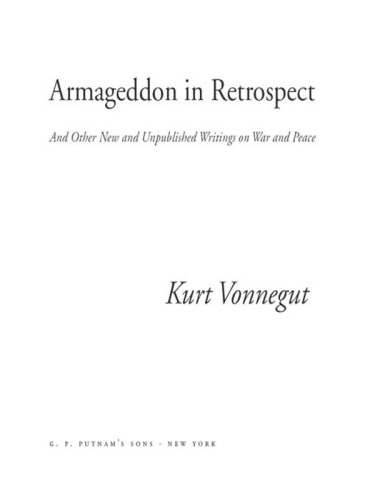
Armageddon in Retrospect
کتاب های مرتبط
- اطلاعات
- نقد و بررسی
- دیدگاه کاربران
نقد و بررسی

Starred review from February 25, 2008
When Kurt Vonnegut died in April 2007, the world lost a wry commentator on the human condition. Thanks to this collection of unpublished fiction and nonfiction, Vonnegut's voice returns full force. Introduced by his son, these writings dwell on war and peace, especially the firebombing of Dresden, Germany. The volume opens with a poignant 1945 letter from Pfc. Kurt Vonnegut Jr. to his father in Indianapolis, presenting a vivid portrait of his harrowing escape from that city. The fiction, full of his characteristic humor, includes stories about time travel and the impossibility of peace in the world (“Great Day”) and, in the title piece, a kind of mock Paradise Lost
, Dr. Lucifer Mephisto teaches his charges about the insidious nature of evil and the impossibility of good ever triumphing. In his final speech, Vonnegut lets go some of his zingers (jazz is “safe sex of the highest order”) and does what he always did best, tell the truth through jokes: “And how should we behave during the Apocalypse? We should be unusually kind to one another, certainly. But we should also stop being so serious. Jokes help a lot. And get a dog, if you don't already have one.” So it goes.

April 15, 2008
A worthy companion to the late Vonnegut's 2005 essay collection, "A Man Without a Country", this collection of new and unpublished short fiction, nonfiction, and artwork examines the horrors of war with Vonnegut's trademark black humor and pessimistic criticism. Only a few of the 12 stories rely on the twists of reality and narrative present in Vonnegut's novels; the majority are carried by the characters' struggle with the absurdities of war and peace. Vonnegut's World War II experience as a prisoner of war in Dresden haunts the work, with multiple stories featuring American POWs in Germany. Completing the book are a nonfiction account of the firebombing of Dresden, a duplicate of a 1945 letter Vonnegut sent home to his father in Indianapolis after the bombing, and a copy of Vonnegut's final speech, written days before his death. The author's son also contributes an introduction. Readers of Vonnegut's books won't find any surprises here, but because he is at his sardonic best when working in short form, they won't be let down by his humor and poignancy, either. Recommended for public and academic libraries. [See Prepub Alert, "LJ" 12/07.]Steven Chabot, Univ. of Toronto
Copyright 2008 Library Journal, LLC Used with permission.

March 15, 2008
The first piece in this collection, a seeming facsimile of the letter Vonnegut wrote to inform his family that he had not, in fact, died in combat, sets the tone for the restindeed, for everything he wrote afterward. In terse, reportorial prose, he describes his internment as a POW, the firebombing of Dresden, and his labors among the dead. In the subsequent speeches, essay, and stories, we see one of the twentieth-centurys better minds wrestling with the horrors of the age, drafting and redrafting, sometimes losing that famous sense of humoritself surely a defense against too much feeling. The work here is uneven: Happy Birthday, 1951 is a simple, affecting story of boys attraction to violence, while Great Day, a time-traveling farce, feels like an outtake. Several others capture the pathetic absurdity of war and its aftermath in the authors trademark tone. Not the best introduction to Vonnegut, but certainly fascinating for his countless fans. Unfortunately, review galleys dont include any provenance for the pieces, an omission that will hopefully be corrected for final publication.(Reprinted with permission of Booklist, copyright 2008, American Library Association.)

























دیدگاه کاربران